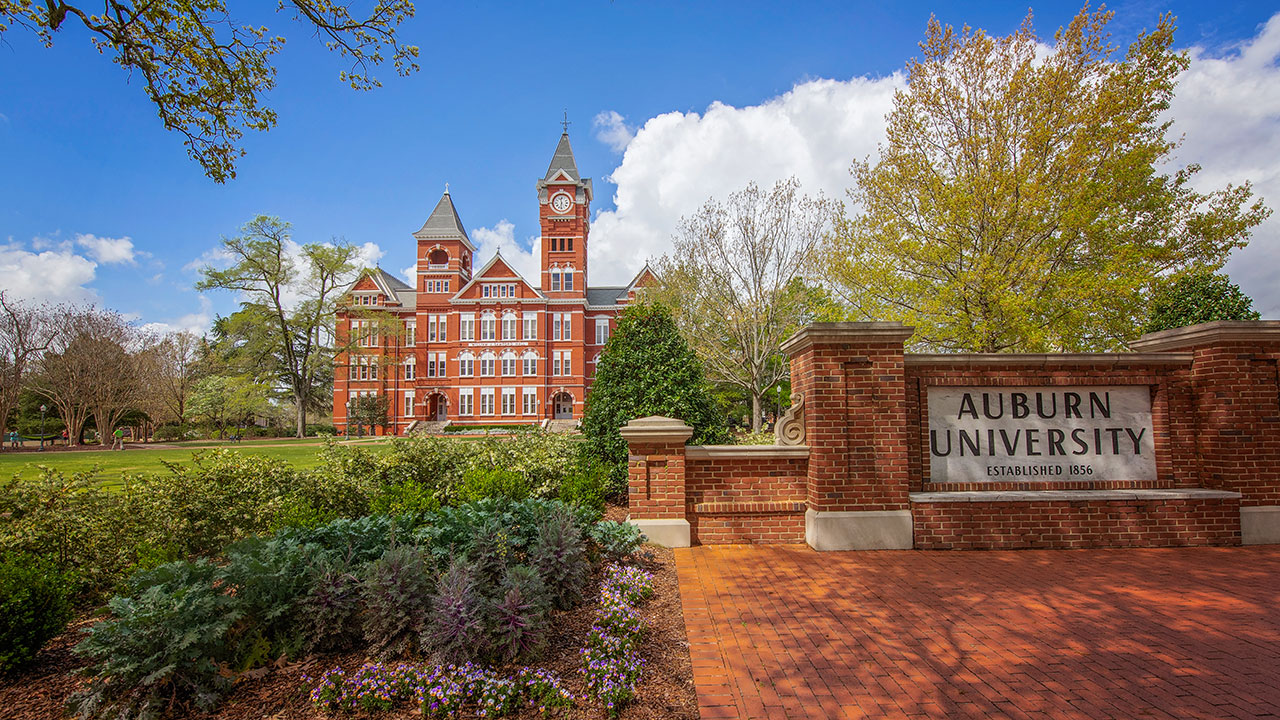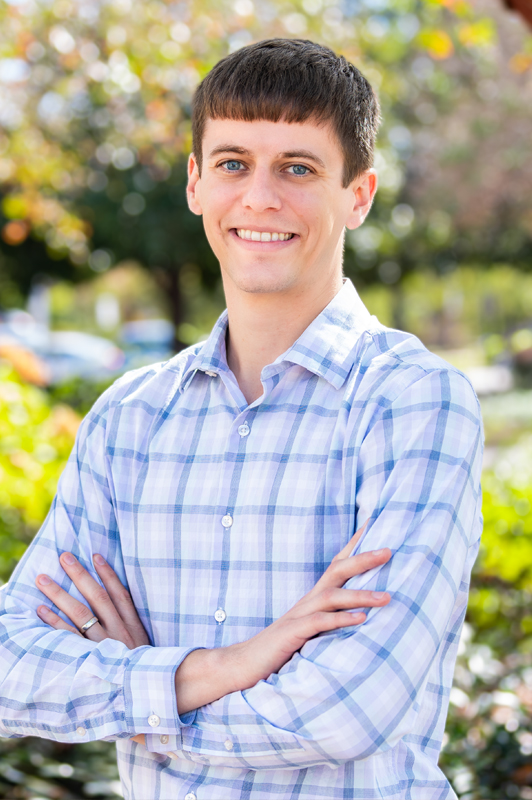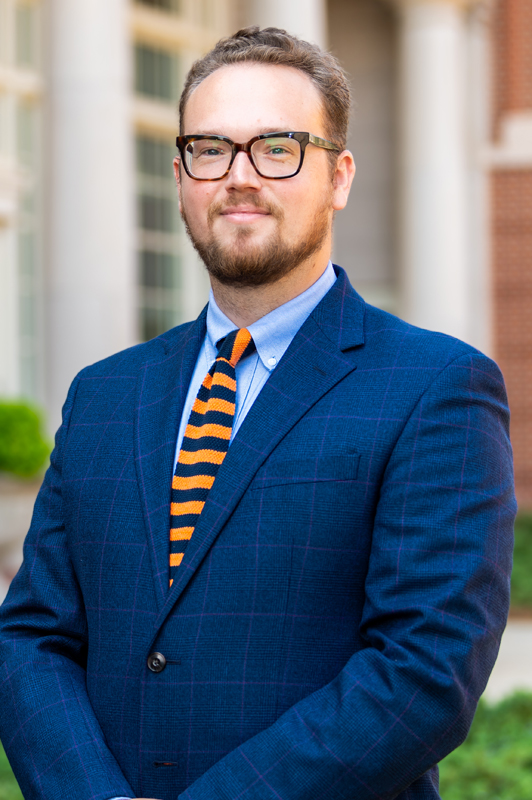Four engineering professors recipients of Auburn's internal research and creative works funding programs
Published: May 16, 2023 1:25 PM
By Staff Report
Four Auburn Engineering assistant professors are among the recipients of Auburn University’s internal research and creative works funding awards programs for 2023.
Chris Kieslich, assistant professor in chemical engineering, and Michael Howard, co-investigator and assistant professor in chemical engineering, are recipients of the research support program (RSP) for their co-authored study, “Data-enabled mesoscale simulations of virus capsid self-assembly.”
Pengyu Chen, assistant professor in materials engineering, was co-investigator with Henry Baker, professor in veterinary medicine on their RSP awarded study, “A Nanoplasmonic Biosensor for Rapid Antemortem Detection of Rabies Infection.”
Chad Rose, assistant professor in mechanical engineering, was co-investigator with Heidi Hausse, assistant professor in history, on their creative work and social impact scholarship awarded study, “Engineering History: An Experimental Approach to Recovering the Lived Experience of a Sixteenth-Century Amputee.”
The Research Support Program and the Creative Work and Social Impact Scholarship Funding Program, or CWSIS, were established by the Office of the Vice President for Research and Economic Development. Both programs provide a competitive internal funding source to support faculty and provide an opportunity for them to experience a small-scale, yet high-quality funding program and refine their projects before competing for larger, external awards.
“This year marked the third pilot for the Creative Works and Social Impact Scholarship Program (CWSIS) and Research Support Program (RSP),” said Christine Cline, associate director of Proposal Services and Faculty Support, the unit administering the programs. “Each year we have been responsive to feedback from applicants and associate deans for research to improve and enhance these programs. The intramural funding mechanism is an important part of the overall research enterprise at Auburn University, and we appreciate the opportunity to work with the faculty members who develop these initial projects with an eye toward expanded scholarship and extramural funding targets.”
The RSP is intended to be an annual cycle funding program to foster the development and growth of innovative and transformational research activities. It builds on faculty expertise, stimulates interdisciplinary collaborations and strengthens seed research activities. It is a strategically focused Auburn investment promoting promising and impactful new lines of research as well as the growth of collaborative and interdisciplinary teams to build the foundations of science, to overcome scientific and societal challenges and to promote and enhance the quality of life and well-being of individuals, groups and communities.
The CWSIS funding program fosters innovation and discovery and builds faculty reputation and competitiveness. Disciplines associated with CWSIS include design and the arts, humanities and applicable areas within business, education, social sciences and health and well-being.
As a form of research, creative work poses questions and searches for the answers through iterative processes that demand intellectual rigor and hard work. The goals of creative work and scholarship are ultimately tied to making significant contributions to a meaningful and dignified quality of life.
The complete list of recipients are:
Research Support Program (RSP)
Henry Baker, College of Veterinary Medicine, “A Nanoplasmonic Biosensor for Rapid Antemortem Detection of Rabies Infection.” Co-Investigator: Pengyu Chen, Samuel Ginn College of Engineering.
Sarit Dhar, College of Sciences & Mathematics, “High temperature ion implantation for Gallium Oxide power electronics.”
Stephen Erath, College of Human Sciences, “Predicting Adolescent Reception of Parental Support: Matches and Mismatches Between Provided and Desired Support.” Co-Investigators: Gregory Pettit, College of Human Sciences; Robert Laird, UA College of Human Environmental Sciences.
Aime Johnson, College of Veterinary Medicine, “Viral Vectored Contraceptive GnRH Vaccine for Cat Population Control.” Co-Investigators: Juan Rodriguez, College of Veterinary Medicine; Douglas Martin, College of Veterinary Medicine.
Christopher Kieslich, Samuel Ginn College of Engineering, “Data-enabled mesoscale simulations of virus capsid self-assembly.” Co-Investigator: Michael Howard, Samuel Ginn College of Engineering.
Daniel Kroeger, College of Veterinary Medicine, “Reducing levels of beta-amyloid (Aβ) and tau by stimulating natural sleep circuits in a mouse model of Alzheimer’s disease.” Co-Investigators: Miranda Reed, Harrison College of Pharmacy; Vishnu Suppiramaniam, Harrison College of Pharmacy.
Lana Narine, College of Forestry, Wildlife & Environment, “Enhancing The Ability to Detect Forest Changes from Hurricane Disturbance Using Multitemporal Spaceborne Lidar and Imagery.” Co-Investigator: Christopher Anderson, College of Forestry, Wildlife & Environment.
Jake Nelson, College of Sciences & Mathematics, “Evaluating community resilience through preparedness behavior using large-scale human mobility data.”
Tanzeel Rehman, College of Agriculture, “Data-Driven High-Throughput Blueberry Drought Tolerant Phenotyping for Sustainable Production Under Changing Climate.” Co-Investigators: Sushan Ru, College of Agriculture; Yin Bao, College of Agriculture; Alvaro Sanz-Saez, College of Agriculture.
Creative Work and Social Impact Scholarship Funding Program (CWSIS)
Heidi Hausse, College of Liberal Arts, “Engineering History: An Experimental Approach to Recovering the Lived Experience of a Sixteenth-Century Amputee.” Co-Investigator: Chad Rose, Samuel Ginn College of Engineering.
Eden McLean, College of Liberal Arts, “The Limits of Fascism: Luigi Molina and the Struggle for Fascist Hegemony in an Italian Borderland, 1923-1944.”
Media Contact: , culluja@auburn.edu, 334.844.8864
The Research Support Program and the Creative Work and Social Impact Scholarship Funding Program provide a competitive internal funding source to support faculty and provide an opportunity for them to experience a small-scale, yet high-quality funding program and refine their projects before competing for larger, external awards.




